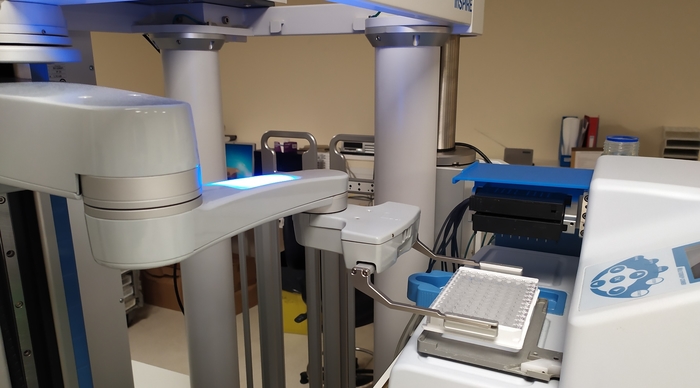NMR has invested £350,000 in a state-of the-art robotic machine that will be integrated into the ELISA testing procedure for its Johne’s disease screening services. This is the first robotic testing equipment in place in the UK for Johne’s screening services, offering benefits to milk producers and the milk supply industry.
Based at its NML West Midlands laboratory, the new robotic machine provides an automated platform that links key stages of the ELISA test together. An ELISA antibody test is the most commonly used means of detecting Johne’s in individual cow milk samples.
“The new robot enables us to automate the whole ELISA test,” says NMR managing director Andy Warne. “The robotic arm carries the testing plates with milk samples between the testing stages, as well as through the incubating and plate reading stages. And the process is carried out consistently within the precise timings required in an ELISA test.”
NMR is seeing a significant increase in demand for Johne’s testing and it anticipates that this will continue as more producers work with their vets on Johne’s control, as part of the National Johne’s Management Plan (NJMP).
Compliance with the NJMP became a requirement for all dairy herds supplying milk under the Red Tractor assurance scheme in October 2019 and accounts for 96% of UK milk production. Currently an estimated 50% of producers have a NJMP Johne’s declaration that must be signed by their vet and confirms that they have an active Johne’s control plan in place.
“NMR is committed to providing highly accurate, reliable and cost-effective disease control services for the UK dairy industry,” adds Mr Warne. “This latest investment is part of our on-going programme that ensures that our dairy producers have high quality, easy-to-use testing services available to them.
“As with many of our testing services, samples already collected for milk quality testing at the time of recording can be used in our disease testing services.”
NMR offers a range of Johne’s testing services, from the 30-cow screening service, used as an initial screen or for herds proven to have very low levels of Johne’s, to the whole herd ad-hoc testing and the routine quarterly HerdWise screening service. This latter is favoured by many producers and vets because it provides an accurate review of all cows in the herd every three months and allows for precise control measures to be implemented and updated.


